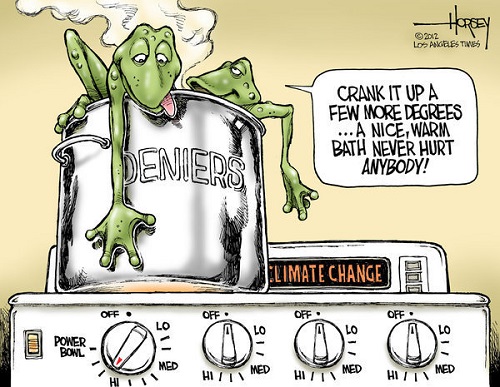2013 SkS Weekly Digest #30
Posted on 28 July 2013 by John Hartz
Toon of the Week

Quote of the Week
The head of the research, Dr David Lavers, from the department of meteorology at the University of Reading, said: "ARs (atmospheric rivers) could become stronger in terms of their moisture transport. In a warming world, atmospheric water vapour content is expected to rise due to an increase in saturation water vapour pressure with air temperature. This is likely to result in increased water vapour transport.
"The link between ARs and flooding is already well established, so an increase in AR frequency is likely to lead to an increased number of heavy winter rainfall events and floods. More intense ARs are likely to lead to higher rainfall totals, and thus larger flood events."
Worse floods ahead for UK as climate warms, say scientists by Paul Brown, for Climate News Network, The Guardian, July 24, 2013
SkS Week in Review
- Each degree of global warming might ultimately raise global sea levels by more than 2 meters by John Hartz
- 2013 SkS Weekly News Roundup #30B by John Hartz
- A tale told in maps and charts: Texas in the National Climate Assessment by Dana
- Update on BC’s Effective and Popular Carbon Tax by Andy Skuce
- How do we know more CO2 is causing warming? by gpwayne
- 2013 SkS Weekly News Roundup #30A by John Hartz
- The climate change policy discussion I wish Andrew Neil would have on BBC by Dana
- Why doesn’t the temperature rise at the same rate that CO2 increases? by gpwayne
SkS Rebuttal Articles Created
Why doesn’t the temperature rise at the same rate that CO2 increases? by gpwayne is a new "basic" level rebuttal of the contrarion argument, "There's no correlation betweenCO2 and temperature."
Likewise, How do we know more CO2 is causing warming? by gpwayne is a new "basic" level rebuttal of the contrarion argument, "Increasing CO2 has little to no effect."
Coming Soon on SkS
- The Albedo Effect and Global Warming (gpwayne)
- An Accurately Informed Public is Necessary for Climate Policy (Dana)
- SkS Weekly News Roundup #31A (John Hartz)
- Toward Improved Discussions of Methane (Chris Colose)
- SkS Weekly News Roundup #31B (John Hartz)
SkS Articles in the Works
- Ocean Acidification: Eating Away at Life in the Southern Ocean (Rob Painting)
- Why Atmospheric CO2 matters: The Really BigPicture (Chris Colose)
- John Christy and high temperature records in the US (Klaus Flemløse)
- New Basic Rebuttal #80: How much will sea levels rise in the 21st Century? (gpwayne)
- How did Ancient Coral Survive in a High CO2 World? (Rob Painting)
- 282 years of global warming in one graph (keithpickering)
SkS in the News
The Consensus Project and 97% consensus result were discussed at Wotts Up With That blog, Climate Progress, Doug Craig's blog at Redding.com, the Yale Law School Cultural Cognition Project, and various climate contrarian blogs.
Fiona Harvey used The Escalator in an article for The Guardian.
SkS was also referenced by Seattle Pi to show that global warming hasn't stopped.































 Arguments
Arguments






























Comments